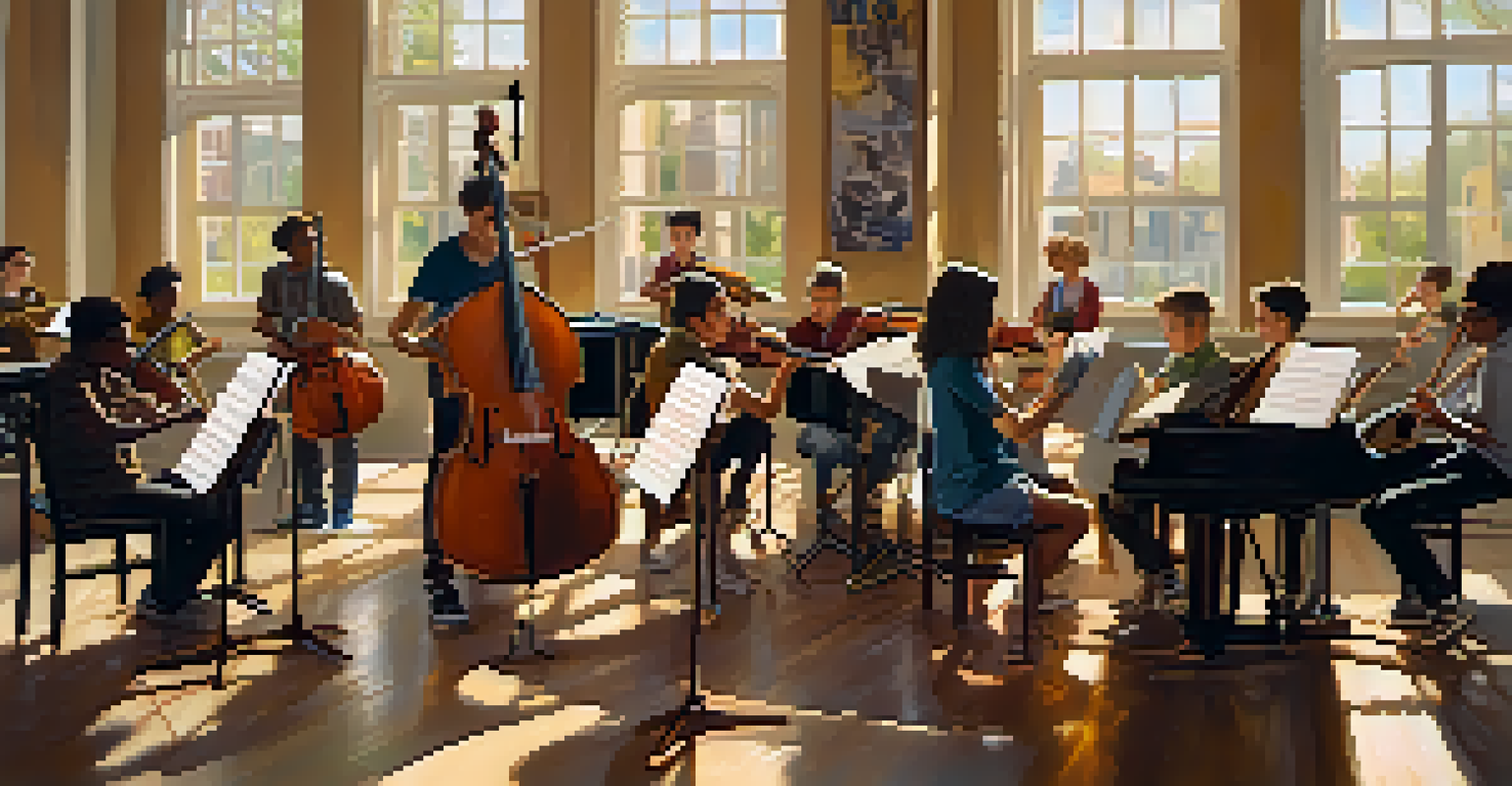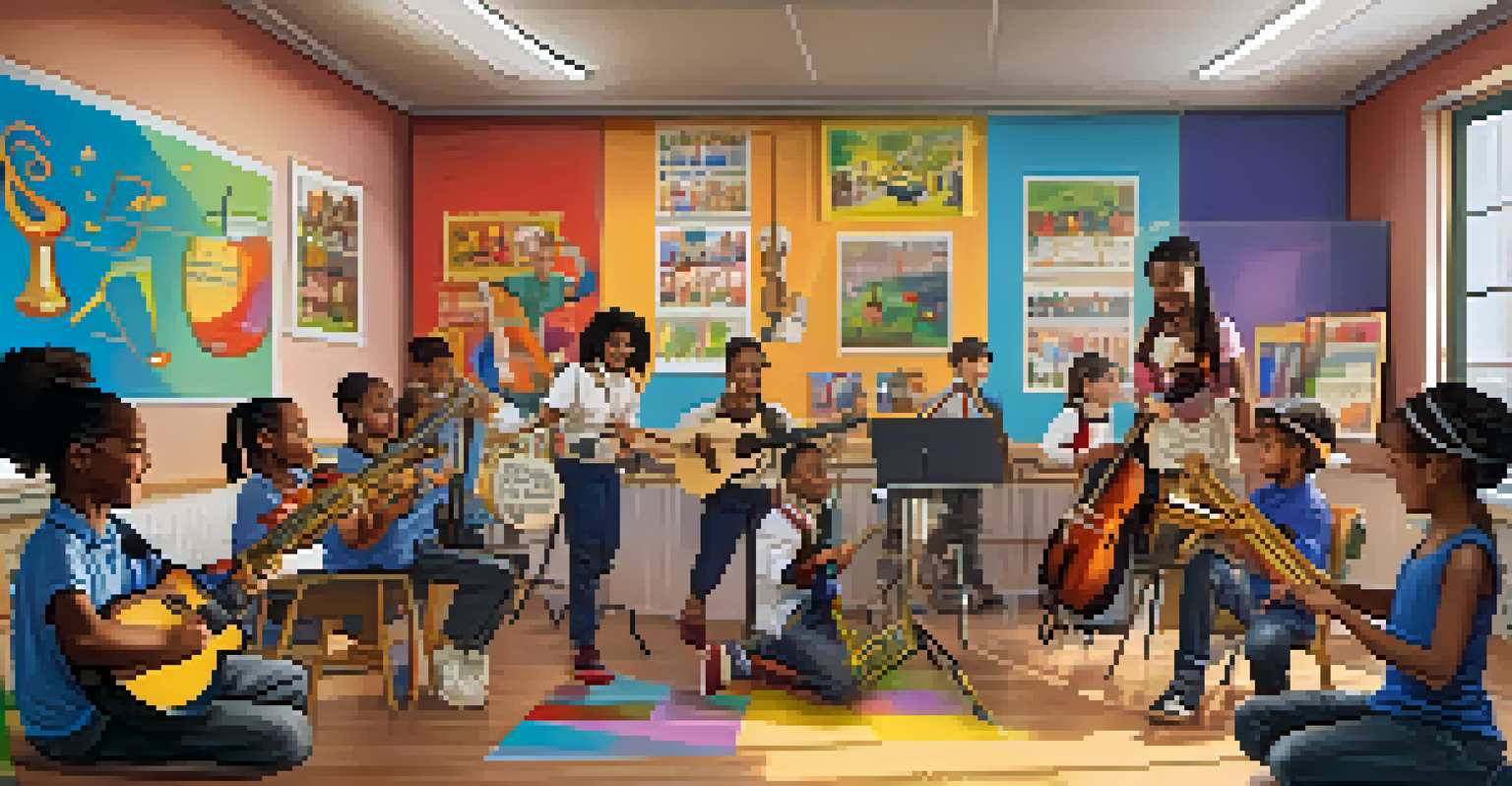Exploring the Role of Music in Urban Community Development

Understanding the Connection Between Music and Community
Music has always been a powerful force in bringing people together. It serves as a universal language, transcending barriers of age, culture, and background. In urban settings, where diversity is rich, music acts as a catalyst for community engagement and social interaction.
Music can change the world because it can change people.
When people gather to appreciate music, whether at concerts, festivals, or informal jam sessions, they create spaces for dialogue and collaboration. These gatherings foster a sense of belonging and identity, which is crucial in bustling cities where individualism can sometimes overshadow community spirit.
Moreover, music often reflects the unique stories and struggles of a community, giving voice to the experiences of its residents. This connection not only enhances cultural pride but also strengthens social bonds, paving the way for collective action and development.
Music as a Tool for Economic Development
The music industry plays a significant role in urban economies. From local musicians performing at small venues to large music festivals attracting tourists, these events create jobs and stimulate local businesses. As communities invest in their music scenes, they often see a ripple effect on other sectors, such as hospitality and retail.

Additionally, music can drive real estate development. Areas known for their vibrant music culture often experience increased property values and investment. This transformation can lead to the revitalization of neighborhoods, attracting new residents and businesses eager to be part of the thriving scene.
Music Unites Communities
Music acts as a universal language that fosters community engagement and social interaction, creating spaces for belonging and identity.
However, it’s essential to balance this growth with the needs of existing residents. As urban spaces evolve, community leaders must ensure that development benefits everyone, preserving the cultural fabric that makes these areas unique.
Fostering Social Change Through Music Initiatives
Music initiatives can serve as a powerful vehicle for social change. Programs that focus on music education, for example, can provide young people with skills, mentorship, and opportunities they might not otherwise have. These initiatives empower youth and can lead to increased self-esteem and community involvement.
Without music, life would be a mistake.
Moreover, music can raise awareness about social issues. Many artists use their platforms to address topics like inequality, mental health, and environmental concerns. Concerts and campaigns organized around these themes can galvanize community action and create a shared sense of purpose.
By harnessing the collective power of music, communities can mobilize resources, engage stakeholders, and drive meaningful change, ensuring that their voices are heard in the broader societal conversation.
The Role of Music Festivals in Urban Revitalization
Music festivals have become a cornerstone of urban revitalization efforts. These events not only showcase local talent but also draw visitors from outside the community, bringing significant economic benefits. When a city hosts a well-organized festival, it can transform public spaces into vibrant hubs of activity.
Beyond the economic impact, festivals enhance community pride and identity. Residents come together to celebrate their culture and heritage, often leading to increased civic engagement. The sense of ownership that develops during such events can inspire ongoing community initiatives long after the music fades.
Economic Growth Through Music
The music industry stimulates local economies by creating jobs, attracting tourists, and driving real estate development.
However, the planning and execution of these festivals must consider the needs of local residents. Inclusivity and accessibility are key to ensuring that all community members feel represented and valued during these celebrations.
Collaborative Projects: Uniting Artists and Communities
Collaborative music projects can bridge the gap between artists and their communities. Programs that involve local musicians working with residents to create music can foster understanding and appreciation for diverse perspectives. This collaboration often results in works that reflect the community's identity and aspirations.
Such initiatives can also break down stereotypes and promote inclusion. When artists engage with different community groups, they create opportunities for dialogue and interaction, which can lead to deeper connections and mutual respect.
Ultimately, these projects empower residents and artists alike, as they co-create a narrative that represents their shared experiences. The result is a rich tapestry of sound that resonates deeply within the community.
Music Education: Shaping Future Generations
Music education programs in urban areas provide vital resources for youth development. Through lessons, workshops, and performances, young people learn not only how to play instruments but also teamwork, discipline, and creativity. These skills translate beyond music, positively impacting their academic and personal lives.
Moreover, exposure to music education can ignite a passion that leads to career opportunities in various fields, from performance to production. This can be especially transformative in underserved communities where access to such resources is limited.
Music Drives Social Change
Music initiatives empower youth, raise awareness about social issues, and mobilize communities to drive meaningful change.
By investing in music education, cities are nurturing the next generation of artists and leaders, ensuring that the cultural landscape continues to thrive.
The Future of Music in Urban Development
Looking ahead, the role of music in urban community development is poised to grow even stronger. As cities face challenges like gentrification and cultural displacement, music can serve as a unifying force that preserves local identity while embracing change. Innovative approaches, such as integrating technology and digital platforms, can enhance community engagement in new ways.
Additionally, there's an increasing recognition of music's therapeutic benefits, particularly in urban environments where stress and anxiety can be prevalent. Initiatives that incorporate music into community health strategies can foster well-being and resilience among residents.

Ultimately, as communities continue to evolve, the integration of music into urban development strategies will be essential for fostering vibrant, inclusive spaces where all voices are valued and heard.